Filter by

Centring Human Connections in the Education of Health Professionals
Centring Human Connections in the Education of Health Professionals equips educators working in clinical, classroom, and online settings with a variety of teaching strategies that facilitate essential human connections. Included is an overview of the educational theory that grounds the authors’ thinking, enabling the educators who employ the strategies included in the book to assess their fit…
- Edition
- -
- ISBN/ISSN
- 9781771992855.01
- Collation
- -
- Series Title
- -
- Call Number
- 166 pages

Centring Human Connections in the Education of Health Professionals
Centring Human Connections in the Education of Health Professionals equips educators working in clinical, classroom, and online settings with a variety of teaching strategies that facilitate essential human connections. Included is an overview of the educational theory that grounds the authors’ thinking, enabling the educators who employ the strategies included in the book to assess their fit…
- Edition
- -
- ISBN/ISSN
- 9781771992855.01
- Collation
- -
- Series Title
- -
- Call Number
- 166 pages
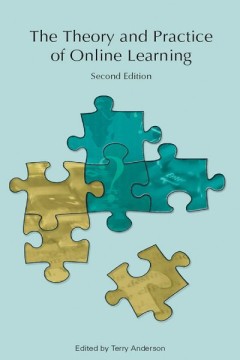
The Theory and Practice of Online Learning
In this important collection of essays by practitioners and scholars that has been downloaded nearly half a million times is an overview of some of the most pressing issues in online education. By addressing transformations arising from educational technology advances and the new business conditions and modes of delivery of education, the contributors to The Theory and Practice of Online Learni…
- Edition
- -
- ISBN/ISSN
- 978-1-897425-08-4
- Collation
- -
- Series Title
- Issues in Distance Education
- Call Number
- 484 pages
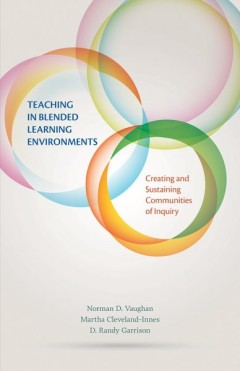
Teaching in Blended Learning Environments Creating and Sustaining Communitie…
Built upon the theoretical framework of the Community of Inquiry – the premise that higher education is both a collaborative and individually constructivist learning experience – the authors present seven principles that provide a valuable set of tools for harnessing the opportunities for teaching and learning available through technology. Focusing on teaching practices related to the desig…
- Edition
- -
- ISBN/ISSN
- 978-1-927356-47-0
- Collation
- -
- Series Title
- Issues in Distance Education
- Call Number
- 5.5 x 8.5, 154 pages

Teaching in Blended Learning Environments Creating and Sustaining Communitie…
Built upon the theoretical framework of the Community of Inquiry – the premise that higher education is both a collaborative and individually constructivist learning experience – the authors present seven principles that provide a valuable set of tools for harnessing the opportunities for teaching and learning available through technology. Focusing on teaching practices related to the desig…
- Edition
- -
- ISBN/ISSN
- 978-1-927356-47-0
- Collation
- -
- Series Title
- Issues in Distance Education
- Call Number
- 5.5 x 8.5, 154 pages
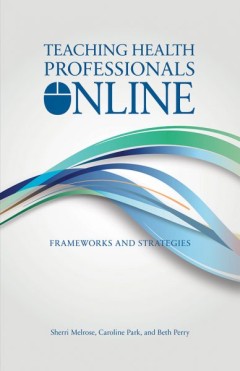
Teaching Health Professionals Online Frameworks and Strategies
Teaching Health Professionals Online is a must-read for professionals in the health care field who strive to deliver excellence in their online classes. Intended for a wide range of professionals, including nurses, social workers, occupational and radiation therapists, chiropractors, dietitians, and dental hygienists, this compendium of teaching strategies will inspire both new and experienced …
- Edition
- -
- ISBN/ISSN
- 978-1-927356-66-1
- Collation
- -
- Series Title
- -
- Call Number
- 173 pages
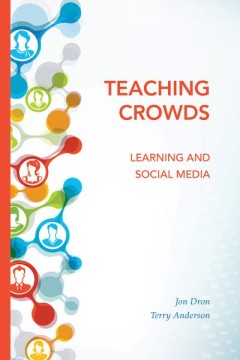
Teaching Crowds Learning and Social Media
In Teaching Crowds, Dron and Anderson introduce a new model for understanding and exploiting the pedagogical potential of Web-based technologies, one that rests on connections — on networks and collectives — rather than on separations. Recognizing that online learning both demands and affords new models of teaching and learning, the authors show how learners can engage with social media pla…
- Edition
- -
- ISBN/ISSN
- 9781927356807.01
- Collation
- -
- Series Title
- Issues in Distance Education
- Call Number
- 370 pages
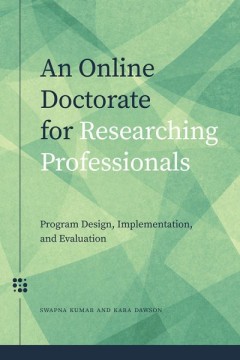
An Online Doctorate for Researching Professionals Program Design, Implementa…
Their program design is grounded in the theoretical and research foundations of online, adult, and doctoral education, curriculum design and community-building, implementation and evaluation. The authors, who draw on their experience of implementing a similar program at the University of Florida, not only share data collected from students and faculty members but also reflect on lessons learned…
- Edition
- -
- ISBN/ISSN
- 9781771992077.01
- Collation
- -
- Series Title
- Issues in Distance Education
- Call Number
- 6 x 9, 225 pages

An Online Doctorate for Researching Professionals Program Design, Implementa…
Their program design is grounded in the theoretical and research foundations of online, adult, and doctoral education, curriculum design and community-building, implementation and evaluation. The authors, who draw on their experience of implementing a similar program at the University of Florida, not only share data collected from students and faculty members but also reflect on lessons learned…
- Edition
- -
- ISBN/ISSN
- 9781771992077.01
- Collation
- -
- Series Title
- Issues in Distance Education
- Call Number
- 6 x 9, 225

Online Distance Education Towards a Research Agenda
Online Distance Education provides a systematic overview of the major issues, trends, and areas of priority in online distance education research. In each chapter an international expert or team of experts provides an overview of one relevant issue in online distance education, discussing theoretical insights that guide the research, summarizing major research on the topic, posing questions and…
- Edition
- -
- ISBN/ISSN
- 9781927356623.01
- Collation
- -
- Series Title
- Issues in Distance Education
- Call Number
- 520
 Computer Science, Information & General Works
Computer Science, Information & General Works  Philosophy & Psychology
Philosophy & Psychology  Religion
Religion  Social Sciences
Social Sciences  Language
Language  Pure Science
Pure Science  Applied Sciences
Applied Sciences  Art & Recreation
Art & Recreation  Literature
Literature  History & Geography
History & Geography